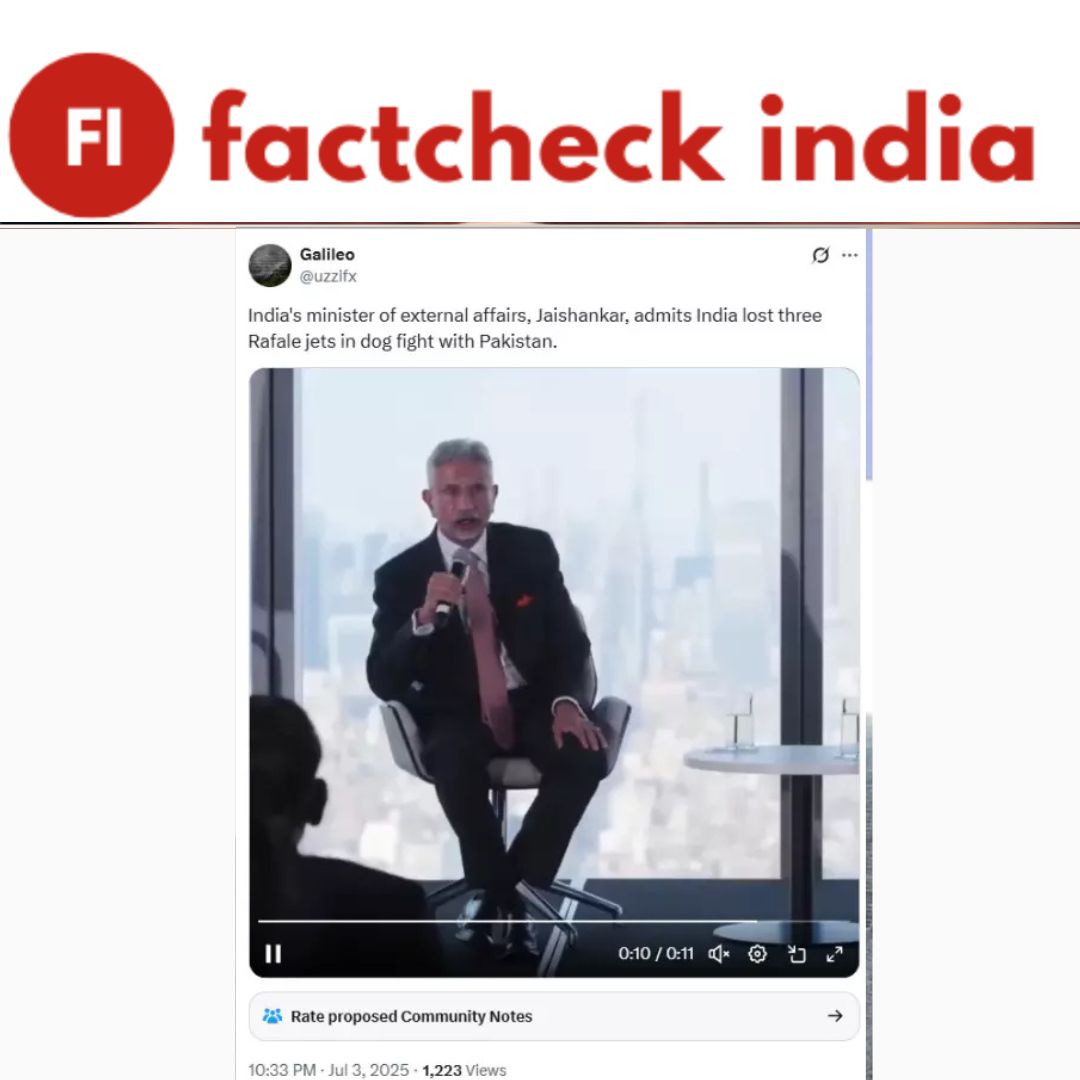Claim: India’s top diplomat, a seasoned statesman like Dr. S. Jaishankar, calmly announces in an interview that India lost three Rafale fighter jets to Pakistan.
Fact: Misinformation. No, India’s top diplomat, a seasoned statesman Dr. S. Jaishankar never said India lost Rafales.
Imagine this: India’s top diplomat, a seasoned statesman like Dr. S. Jaishankar, calmly announces in an interview that India lost three Rafale fighter jets to Pakistan. Alarming? Yes. Believable? Only if you’re willing to ignore the truth — and embrace a lie cooked up by artificial intelligence. Welcome to the new battleground of information warfare, where deepfakes pose as facts, and misinformation spreads faster than missiles.
Let’s break it down.
The Viral Lie: What the Video Claims
A video, now viral across social media — especially on X (formerly Twitter) — shows Dr. Jaishankar allegedly saying:
“We had already lost three Rafales to Pakistan two days ago.”
The caption boldly claims that India’s External Affairs Minister has “admitted” the loss, adding fuel to a narrative that seems tailor-made for propaganda. But there’s just one problem: He never said it. Not once. Not anywhere.
The Truth: A Deepfake Dressed as Diplomacy
The video in question was dissected by fact-checkers. Using reverse image search, experts traced it back to an authentic interview — a 49-minute conversation between Dr. Jaishankar and Newsweek CEO Dev Pragad, published on Newsweek’s official YouTube channel on July 1.
And what did Jaishankar actually say during the portion that went viral (around 43:05)?
“Something that you know, Pakistanis did attack us massively that night. We responded very quickly thereafter. And the next morning, Mr. Rubio called me up and said the Pakistanis were ready to talk.”
Nowhere and absolutely nowhere. It does he mention Rafale jets, aircraft losses, or any military admission.
The truth is, the viral clip is a digitally manipulated deepfake. The creators used AI-generated audio to insert fake lines over real footage and an insidious tactic that exploits both trust and technology.
MEA Steps In: “It’s Fake. Stop Sharing It.”
In an era of viral lies, India’s Ministry of External Affairs didn’t stay silent. Their official MEA Fact Check handle swiftly debunked the video with this clear message:
“A digitally manipulated video of EAM Dr. S Jaishankar is being shared with false claims. No such statement was made. Kindly avoid sharing misleading content.”
That’s as official and as clear as it gets.
Who’s Behind the Disinformation?
A closer look at the accounts amplifying this fake video shows a pattern and most of them are based in Pakistan, part of a coordinated attempt to spread misinformation following the Pahalgam terror attack. This isn’t the first time. And it won’t be the last. Disinformation has become a weapon of modern conflict, used not on battlefields, but in our browsers.
Deepfakes Are Here. And They’re Dangerous.
What makes this video particularly troubling isn’t just its content. It’s the technology behind it. This is AI-powered deception, where synthetic voices and manipulated visuals blur the line between truth and fiction. Deepfakes don’t just spread lies and they erode trust, damage reputations, and undermine democracy. So the next time you see a shocking video, ask yourself.
Is it real — or is it just reality’s evil twin in digital disguise?
The Real Story: Context Matters
Let’s not forget the real backdrop here.
- On April 22, India lost 26 lives in a brutal terror attack in Pahalgam.
- India responded with Operation Sindoor, a targeted strike on terror camps across the border.
- Pakistan retaliated with limited military actions.
- A four-day conflict followed and before a tense return to diplomacy.
This was a serious escalation. Emotions are still raw.
And in such moments, misinformation is a spark that can ignite far worse fires.
Verdict: Fake
No, Jaishankar never said India lost Rafales. The viral video uses AI-generated voice and is digitally altered. The Ministry of External Affairs has officially confirmed it’s fake. The campaign is linked to Pakistan-based social media accounts.
Why This Fact Check Matters
Because in today’s world, truth isn’t just what happened. It’s what survives the algorithm.
Fake videos, false quotes, AI-generated propaganda and they all thrive on our clicks, our shares, our outrage. Don’t be a pawn in someone else’s narrative. Verify before you amplify with Factcheck India. Because when lies go viral, it’s up to us to stop the spread and stay Vigilant with Factcheck India.

